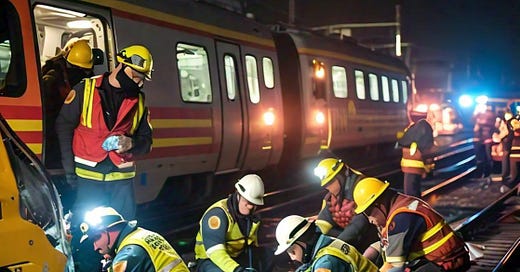Train Accident in India: A Sobering Reminder of Safety Concerns
Derailment of Mysore-Darbhanga Bagmati Express Highlights Need for Improved Infrastructure and Oversight
A train accident involving the Mysore-Darbhanga Bagmati Express in Tamil Nadu, India, raises concerns about safety and infrastructure in the Indian railway system. This tragic incident underscores the urgency of investing in upgrades, implementing stricter regulations, and ensuring the well-being of passengers.
October 12, 2024.
At least 12 12578 Mysore-Darbhanga Bagmati Express coaches derailed around 8:30 p.m. after colliding with a goods train stationary at Kavaraipettai in Tamil Nadu's Triuvallur district near Chennai.
Sources said 10 injured passengers were admitted to a hospital nearby, and the express train's parcel van caught fire.
Rescue operations are underway as emergency services rush to the scene to assist the injured passengers and assess the extent of the damage. The cause of the accident is still under investigation, but initial reports suggest that human error may have played a role in the collision. This tragic incident serves as a stark reminder of the urgent need for improved safety measures and stricter regulations in the Indian Railways to prevent such disasters from occurring in the future.
Such unfortunate incidents highlight the importance of constant vigilance and oversight in Indian Railways. It also underscores the necessity of investing in infrastructure upgrades and maintenance to ensure the safety of passengers and staff. Ultimately, the goal is to create a more secure and reliable transportation system.
While the railways envisage bullet trains, they must focus on improving the existing infrastructure to prevent accidents and ensure efficient operations.
Before this mishap, several trains safely passed through the same tracks. However, this incident serves as a sobering reminder that even one mistake or oversight can lead to tragic consequences. There are many concerns, including the need for thorough investigations to determine the cause of the accident and prevent future occurrences.
Additionally, proper training and oversight of railway personnel must be emphasised to ensure that safety protocols are strictly followed. The public's trust in the transportation system has been shaken, and steps must be taken to restore confidence in the railways.
The route of train 12578, the Mysore-Darbhanga Bagmati Express, is a glaring example of inefficiency and safety concerns in the Indian railway system. This train, connecting the cities of Mysore and Darbhanga, takes a circuitous path that adds an astounding 585 kilometres (24%) to the journey, significantly longer than the shortest feasible route. As a result, the travel time on this train extends to an excruciating 53.5 hours, causing immense discomfort and inconvenience to passengers.
This unnecessarily long route raises serious concerns about the railway's operations' efficiency and passengers' safety. The extra distance travelled increases fuel consumption, operating costs, and environmental degradation. Furthermore, the prolonged journey time compromises passengers' well-being, leading to fatigue, physical strain, and increased exposure to potential risks.
The ongoing tragedy of train accidents in India underscores the urgent need for comprehensive reforms and safety enhancements in the railway infrastructure. By learning from past mistakes and implementing necessary changes, we can strive towards a future where such accidents are minimized and passengers can travel without fear or apprehension.
While technological advancements and advancements in high-speed rail networks are essential for progress, we must not overlook the importance of safety and reliability in our transportation infrastructure. Investing in robust track maintenance, modern signalling systems, and improved rolling stock can significantly reduce the likelihood of accidents and enhance passenger comfort. Additionally, implementing strict safety protocols, regular inspections, and thorough training for railway personnel is crucial to ensure trains' smooth and efficient operation.
As we navigate the complexities of modern transportation, we must prioritize safety above all else. By learning from past tragedies and implementing comprehensive reforms, we can transform our railways into a safe, reliable, and efficient mode of transportation that serves passengers' needs and contributes to our nation's overall progress.





